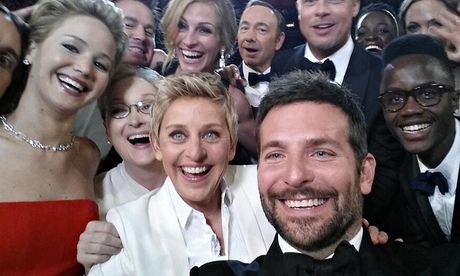
No, of course it wasn't a marketing stunt. Samsung may have paid a reported $20m (£12m) for its advertising "integration" during last Sunday's broadcast of the Oscars, but the company, it insisted, was every bit as astonished as everyone else when host Ellen De Generes's star-studded selfie, taken during the broadcast on a Samsung smartphone, became the most retweeted message of all time.
Spontaneous or not – and footage of De Generes in rehearsal for the Academy Awards discussing how to break the retweet record rather suggests not – the picture, taken by actor Bradley Cooper and featuring a scrum of celebrities including Meryl Streep, Jennifer Lawrence, Brad Pitt and Kevin Spacey, was forwarded on Twitter more than 2m times by the time the ceremony was done, causing the social media site briefly to collapse and ensuring that coverage of the awards focused almost less on the winners than on the selfie.
You know what a selfie is, of course. You'll have taken them on your smartphone, shared the most flattering with your Facebook friends, posted some to your Twitter page, edited others on your Instagram site.
If you don't, your children certainly do. Celebrities in their underwear do it, astronauts on space walks do it, the pope pauses with worshippers to do it, Barack Obama and David Cameron interrupt funerals to do it.
And while we may sniff about triviality and self-promotion and a culture of narcissism, more and more of us are doing it too. Britain is a nation of social networkers – 57% of UK adults use social media regularly according to the Office for National Statistics, the second highest proportion in the EU. Increasingly what we are sharing with our friends, followers and feeds are hasty, poorly-focused images of ourselves, as seen from the other end of our outstretched arms.
Britons now take 35m selfies a month, a survey found last year, and while the craze's popularity among the young is undeniable, this is not a habit confined to teenage girls. More than half of British adults have apparently taken one, including 29% of the over 65s. The term was judged the word of 2013, and has earned its place in the dictionary, as well as the cultural consciousness.
And if you're still not sure how it works, US Teen Vogue has a handy primer: "It's easy. Flip the view on your phone and hold it at a high angle, making your eyes look bigger and your cheekbones more defined. Position your thumb over the button, turn to your best side; and click."
Though the word seems to have originated in the middle of the last decade among users of photo-sharing sites like Flikr, humans have been taking photographs of themselves, and before that painting their own picture, for long enough to make much of this familiar. But there are aspects of the selfie phenomenon that are genuinely novel, argues Eugenie Shinkle, senior lecturer in photographic theory and criticism at the University of Westminster.
The nature of traditional portraiture, she says, is to capture "something enduring about the person, the essence of the subject. The selfie is very different, it's about capturing the nature of a moment. They are not meant to last, to linger in the memory in the same way."
But what do we say about ourselves by taking so many photographs – of ourselves? What does it mean when no concert or sunset, no snatched street scene or beautiful view is complete without our own awkwardly craned heads obscuring the picture?
The obvious conclusion is that – even if Ellen and friends may have just beaten us to it – as a society we have become insufferably vain. Rosy Martin, a photographer and artist working particularly with self-portraiture, is not convinced. "I could come over all old-fashioned about the morality of self-obsession, but I used to look in the mirror when I was a teenager. I used to practice head positions, standing positions. People have always looked for visual references. That is not new."
She agrees, however, that selfies are very often idealised versions of ourselves; digital technology allows us to snap eight or 10 versions of the same picture, discarding the ones in which we are squinting or look haggard. "The selfie is about creating an image of yourself for the world."
That self-regard implicit in any selfie lends itself easily to ridicule, as seen in the wave of instant parodies of the Oscars picture. A photo tweeted by David Cameron this week of himself supposedly talking on the phone to Obama, though not taken by the PM, sparked a backlash of spoof selfies in which celebrities and others snapped themselves supposedly listening in.
While the phenomenon may continue to puzzle some, to those who have grown up with the camera phone, the selfie is a means of communication like email or phonecalls, argues Gillian Youngs, professor of digital economy at the university of Brighton.
"The selfie is about capturing yourself in a moment of some kind," she says, just another way of saying: I am here. "Wherever we are – whether we are on the loo, wherever – our phones are with us." Just as well, as she notes, that not every selfie has to be shared.

